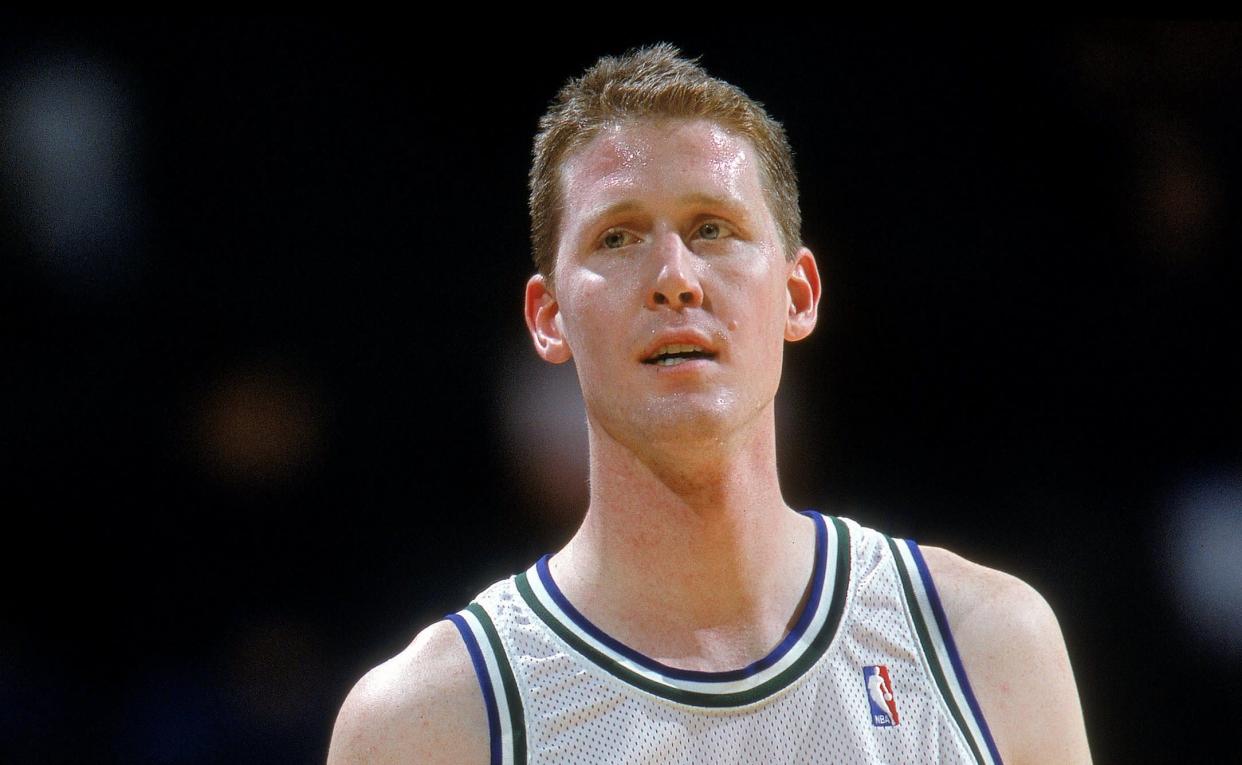Editor's note: This story contain a description of suicidal thoughts. If you or someone you know is having thoughts of suicide, the National Suicide Prevention Lifeline is available 24 hours a day at 1-800-273-8255.
For the first time, Shawn Bradley is opening up about the bike accident that left him paralyzed from the chest down.
The former Dallas Mavericks center and 14-year NBA veteran recently spoke to Sports Illustrated's Brian Burnsed about the collision and its aftermath. It happened in Jan. 2021, as the 7-foot-6 Bradley was riding his bike around his neighborhood in St. George, Utah.
In a Dodge minivan just behind him, a young mother was hustling to pick up her child from school. Bradley, who avoids naming the driver, to shield her from public scrutiny, says she bumped him from behind as he drifted left to avoid the [parked] Saturn—his Garmin GPS shows that he instantaneously accelerated to 17 mph—which propelled him toward the parked car. The shifter on his right handlebar caught the Saturn’s rear flank and jerked his front wheel sharply to the right, pulling the bike to a sudden stop and sending Bradley’s colossal body skyward.
Bradley tumbled over the trunk and the driver’s side of the Saturn, and he landed headfirst on the asphalt, his helmet cracking under his 300-odd pounds.
Bradley was conscious as he laid on the ground, and was quickly aware that he couldn't move his arms or legs or even control his breathing. At the hospital, Bradley's wife, Carrie, and her three children learned that the crash had damaged Bradley's spinal cord, and he was now a quadriplegic, with no sensation from the top of his ribcage down.
A changed life
Bradley spent three months in the ICU, and then another four months in rehab. He was able to regain tiny slivers of independence — he learned how to feed himself with a fork again — but had to come to terms with how different his life was going to be. Via Sports Illustrated:
In those long weeks he missed riding his motorcycle, taking his boat out on Sand Hollow Reservoir, wrestling with his kids, wrapping his arms around Carrie from behind and giving her a gentle squeeze. And as the days wore on, measured by the changing holiday decorations at the hospital, the sum of these modest losses grew profound. “All those little things mean the world to me,” Bradley says.
There's more than just little things. Bradley is 7-foot-6 and weighs over 300 pounds, and most medical facilities, treatments and devices aren't designed for someone with such a commanding stature. He didn't fit in the hospital shower and was too heavy for one person to transport from chair to bed to exam table. Hospital and rehab staff had to reconfigure medical equipment to account for his size, and his family needed to have an electric wheelchair custom made to fit him.
Bradley now has a caregiver, but a lot of the work falls on Carrie. He told Sports Illustrated that he constantly struggles with being a burden, saying “This isn’t what ‘in sickness and in health’ typically means.” He has even had suicidal thoughts, but said he'd never act on them.
Bradley is awed by his wife and all that she has done, not just to keep him alive but to make life worth living. For years, his presence buoyed their family. Now, unquestionably, he is their preeminent concern—and “I don’t know how I can ease the burden of me,” he says. When that conundrum weighs most heavily upon him, he can’t avoid considering one way to solve it. “Maybe it’d be better if this was just all over,” he says. “Yes, those thoughts creep in — and they’re real. I can’t ever imagine myself acting on those thoughts, but I definitely have them.”
Even meeting with old friends can be tough. Mavs owner Mark Cuban and his former teammate Dirk Nowitzki flew to Bradley's home in April, and while Bradley enjoyed reminiscing and spending time with people he loved, he spent the next day in tears.
“People that I’m very close with, the first time they see me, it’s emotional,” Bradley said. “It’s extremely draining.”
Bradley knows there's more of that to come. His life has irrevocably changed. Instead of taking bike rides, his current goal is to be able to move his enormous frame from his chair to the bed and back without any help. That skill will allow Bradley to regain some of his independence, and he's determined to achieve it.
“That’s something we all think is possible,” Bradley says. “We’re not there yet — but we’re getting there.”
Source: Read Full Article
